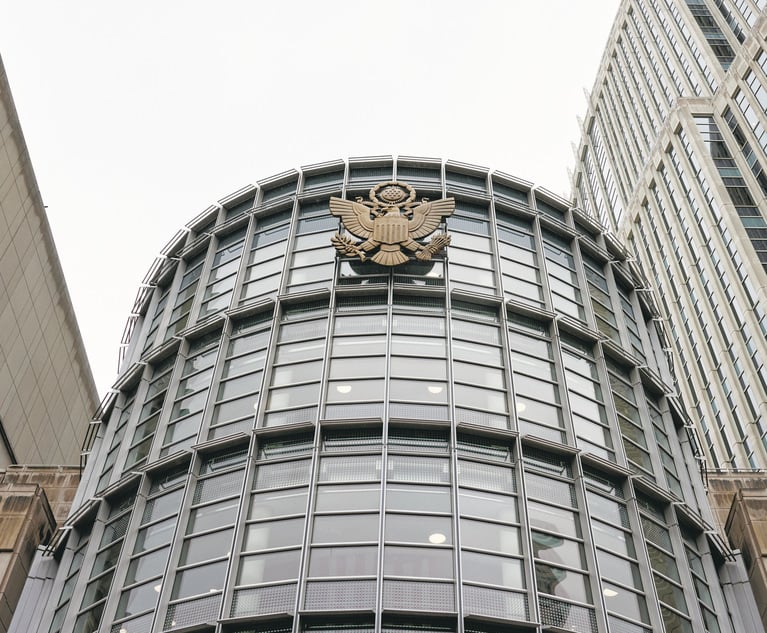Second Circuit Details How Marijuana Convict's Speedy Trial Right Was Violated
The three-judge panel made clear that the court system and government prosecutors from the Western District of New York, along with Joseph Tigano III's own court-appointed defense lawyer, had let him down at nearly every juncture of his seven-year wait for trial.
January 23, 2018 at 06:32 PM
7 minute read

Describing an “egregiously oppressive” seven years of pretrial detention as a “ceiling, rather than a floor” for speedy trial-right analysis, the U.S. Court of Appeals for the Second Circuit on Tuesday issued a full opinion explaining why it chose last fall to release marijuana convict Joseph Tigano III from prison a decade early.
In 41 pages, the three-judge panel made clear that the court system and government prosecutors from the Western District of New York, along with Tigano's own court-appointed defense lawyer, had let him down at nearly every juncture of his seven-year wait for trial.
Second Circuit Judges Ralph Winter, John Walker Jr. and Rosemary Pooler laid bare that Tigano's treatment amounted to the worst violation of a criminal suspect's Sixth Amendment constitutional right to a speedy trial that they had ever seen. Likewise, the judges indicated that they expected their detailed opinion to be both an alert and teaching moment for prosecutors and court systems across the region.
“We reiterate that the nearly seven years of pretrial detention in this case, as well as Tigano's single‐minded focus on obtaining a speedy trial, present extreme facts in the speedy trial context. In other words, these facts represent what we expect will be a ceiling, rather than a floor, for Sixth Amendment analysis,” the judges wrote in the unanimous opinion.
“On Jan. 21, 2010, the slow progression of the case left Tigano to reflect that '[s]o much time has gone by,'” the judges continued. Yet “he would wait another 1,929 days—over five years—before his case would eventually proceed to trial. Tigano's years of imprisonment represent a failure of our courts to comply with their obligation to bring defendants to a speedy and public trial.”
At multiple points in the opinion, the judges also noted that Tigano's seven years of waiting for trial—on charges that included manufacturing 1,000 or more marijuana plants, possession with intent to distribute and being a felon in possession of a firearm—“appears to be the longest period of pretrial incarceration we have seen in a speedy trial context in this circuit.”
They added, “In addition to the sheer passage of time, [Tigano's] confinement in local jails makes those years particularly oppressive. The [U.S. Supreme Court in] Barker [v. Wingo, 407 U.S. 514 , 532-33 (1972)] noted that '[m]ost jails offer little or no recreational or rehabilitative programs. The time spent in jail is simply dead time.'”
On Wednesday, James Kennedy Jr., the U.S. Attorney for the Western District of New York, appeared to concede that the justice system had failed Tigano. In a statement sent to the Law Journal, he said, “The defendant received a fair trial after which he was convicted by a jury…. However, there is an old adage in the law that 'justice delayed is justice denied.' Sadly, as the Second Circuit's decision makes clear, the delay in this case resulted in a denial of justice to all involved.”
In November, the Second Circuit issued a terse order that released Tigano from prison more than a decade before his 20-year mandatory minimum sentence for his 2015 conviction on marijuana-based charges was set to end. The order did not give the circuit's reasons for releasing Tigano, 54, from prison. But given oral arguments in the case, extensive briefing and the “with prejudice” dismissal of all charges against him, it appeared that the panel found his Sixth Amendment constitutional right to a speedy trial had been stripped.
On Tuesday, the panel confirmed that the violation of his Sixth Amendment right was the basis for his release and the dismissal of his case, and the judges detailed the errors and delay that led to his seven years of waiting for trial. The factual history laid out by the panel in its opinion, and the judges' reasons for attributing most of the delay to the government, mirrored much of what Tigano's pro bono attorneys at Schulte Roth & Zabel in Manhattan had argued in briefing.
Wrote the panel, “The reasons for the delay in this case were largely due to: 1) the needlessly repetitive and dilatory competency examinations, all of which found Tigano competent; 2) administrative delays, including the delay in conducting the third court‐ordered competency hearing (itself unnecessary in light of the two prior court‐ordered exams and hearings) because the USMS [United States Marshals Service] failed to provide timely transportation; 3) the government's failure for months to produce a written plea offer, despite the age of the case, and its insistence on consolidating the case and plea bargaining with Tigano's father; 4) the district court's congested docket and failure to give this case priority; 5) the use of multiple magistrate judges resulting in confusion regarding responsibility and one judge having to await rulings by another; and 6) defense counsel's desire to delay the trial in hopes of a favorable plea, notwithstanding Tigano's express desire to proceed quickly to trial.”
The panel also noted, “Tigano adamantly, consistently and explicitly raised his speedy trial rights at nearly every appearance he made before the court.”
Gary Stein, a litigation partner at Schulte Roth, and Andrew Gladstein, a Schulte Roth associate on the case, had argued that many factors—from unnecessary competency evaluations to crisscrossing magistrate judges—contributed to the government negligently delaying his trial for years. They claimed that the government's multitude of misplaced actions and fixable problems led to at least four years of unnecessary pretrial waiting. In addition, they grounded their arguments in a disturbing picture of a Western District of New York court system that, as they told it, seemed to chug to a standstill.
“The record in this case can only properly be understood in the context of the caseload crisis that gripped the Western District of New York during the period of Tigano's prosecution,” they wrote in an 81-page brief filed with the panel.
In an interview in November, at the time of Tigano's release, Gladstein told the Law Journal that Tigano's case was a high point in his lengthy career.
“It was an opportunity to give to Joe the type of legal defense that I think everyday defendants should be entitled to,” he said. “It was something we took humbly and seriously, and I am elated that we were able to come through for him.”
Joseph Karaszewski, an assistant U.S. attorney and the Western District's chief of appeals, who helped handle the Second Circuit briefing and argument for prosecutors, said by phone in November that he had no comment on the Second Circuit panel's order, other than that his team would “wait to see what the court says in the opinion.”
Karaszewski could not be reached for further comment on Tuesday.
Tigano was arrested and charged, along with his father, in 2008. Drug Enforcement Administration agents found at least 1,400 marijuana plants growing inside his home, documents said. His father, Joseph Tigano Sr., took a plea deal in the years afterward and avoided jail time. But Tigano III, the son, was locked away during the pretrial process.
Early on, prosecutors had said his case would not take long to try—just a week or less, according to documents.
After Tigano was put before a jury in 2015, the trial ran for five days. He was convicted of manufacturing marijuana and intent to distribute. At his sentencing, U.S. District Judge Elizabeth Wolford—taking over the matter from former Chief Judge William Skretny, who was assigned to the case throughout most of its duration—said she believed his 20-year sentence was too long, but that her hands were tied by mandatory minimum sentencing rules that apply to a previous offender.
The Buffalo News has said that Tigano's case became one of those cited around the country by advocates who argue against such drug sentencing minimums in the federal system.
This content has been archived. It is available through our partners, LexisNexis® and Bloomberg Law.
To view this content, please continue to their sites.
Not a Lexis Subscriber?
Subscribe Now
Not a Bloomberg Law Subscriber?
Subscribe Now
NOT FOR REPRINT
© 2025 ALM Global, LLC, All Rights Reserved. Request academic re-use from www.copyright.com. All other uses, submit a request to [email protected]. For more information visit Asset & Logo Licensing.
You Might Like
View All
Haynes and Boone Expands in New York With 7-Lawyer Seward & Kissel Fund Finance, Securitization Team
3 minute read
Ticket-Fixing Scheme Results in Western NY Judge's Resignation—for a Second Time

Disbarred NY Atty Receives 54-Month Prison Sentence After $3M Embezzlement
3 minute read
Legal Community Mourns the Loss of Trailblazing Judge Dorothy Chin Brandt
Trending Stories
Who Got The Work
J. Brugh Lower of Gibbons has entered an appearance for industrial equipment supplier Devco Corporation in a pending trademark infringement lawsuit. The suit, accusing the defendant of selling knock-off Graco products, was filed Dec. 18 in New Jersey District Court by Rivkin Radler on behalf of Graco Inc. and Graco Minnesota. The case, assigned to U.S. District Judge Zahid N. Quraishi, is 3:24-cv-11294, Graco Inc. et al v. Devco Corporation.
Who Got The Work
Rebecca Maller-Stein and Kent A. Yalowitz of Arnold & Porter Kaye Scholer have entered their appearances for Hanaco Venture Capital and its executives, Lior Prosor and David Frankel, in a pending securities lawsuit. The action, filed on Dec. 24 in New York Southern District Court by Zell, Aron & Co. on behalf of Goldeneye Advisors, accuses the defendants of negligently and fraudulently managing the plaintiff's $1 million investment. The case, assigned to U.S. District Judge Vernon S. Broderick, is 1:24-cv-09918, Goldeneye Advisors, LLC v. Hanaco Venture Capital, Ltd. et al.
Who Got The Work
Attorneys from A&O Shearman has stepped in as defense counsel for Toronto-Dominion Bank and other defendants in a pending securities class action. The suit, filed Dec. 11 in New York Southern District Court by Bleichmar Fonti & Auld, accuses the defendants of concealing the bank's 'pervasive' deficiencies in regards to its compliance with the Bank Secrecy Act and the quality of its anti-money laundering controls. The case, assigned to U.S. District Judge Arun Subramanian, is 1:24-cv-09445, Gonzalez v. The Toronto-Dominion Bank et al.
Who Got The Work
Crown Castle International, a Pennsylvania company providing shared communications infrastructure, has turned to Luke D. Wolf of Gordon Rees Scully Mansukhani to fend off a pending breach-of-contract lawsuit. The court action, filed Nov. 25 in Michigan Eastern District Court by Hooper Hathaway PC on behalf of The Town Residences LLC, accuses Crown Castle of failing to transfer approximately $30,000 in utility payments from T-Mobile in breach of a roof-top lease and assignment agreement. The case, assigned to U.S. District Judge Susan K. Declercq, is 2:24-cv-13131, The Town Residences LLC v. T-Mobile US, Inc. et al.
Who Got The Work
Wilfred P. Coronato and Daniel M. Schwartz of McCarter & English have stepped in as defense counsel to Electrolux Home Products Inc. in a pending product liability lawsuit. The court action, filed Nov. 26 in New York Eastern District Court by Poulos Lopiccolo PC and Nagel Rice LLP on behalf of David Stern, alleges that the defendant's refrigerators’ drawers and shelving repeatedly break and fall apart within months after purchase. The case, assigned to U.S. District Judge Joan M. Azrack, is 2:24-cv-08204, Stern v. Electrolux Home Products, Inc.
Featured Firms
Law Offices of Gary Martin Hays & Associates, P.C.
(470) 294-1674
Law Offices of Mark E. Salomone
(857) 444-6468
Smith & Hassler
(713) 739-1250






